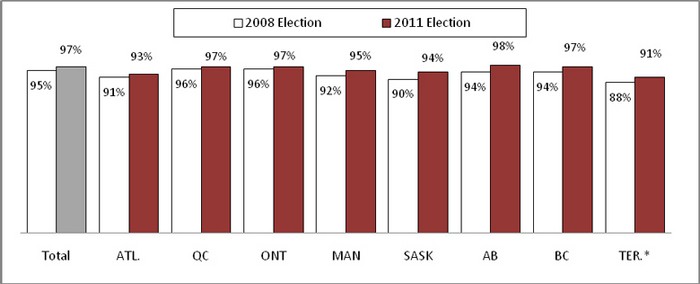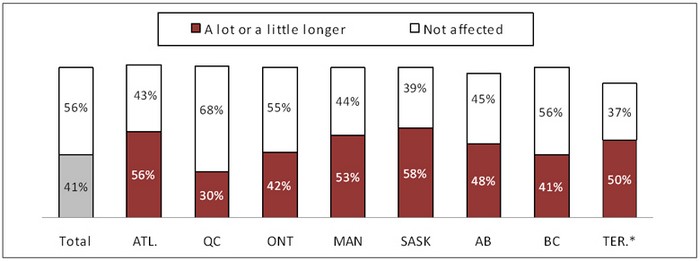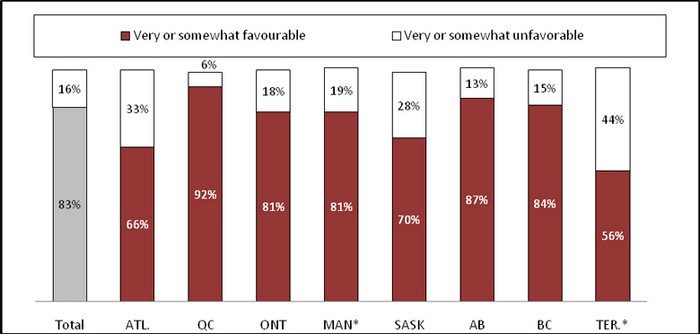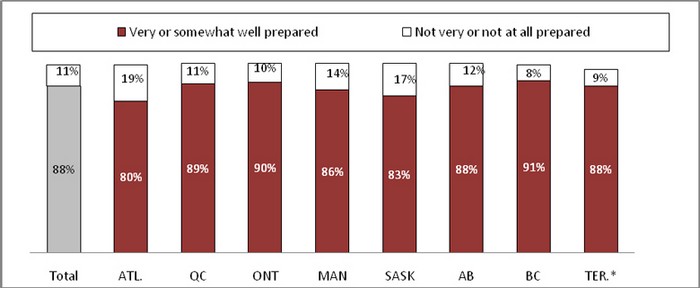Survey of Election Officers following the 41st Federal General Election
Section 8: Voter ID Requirements
This section provides an in-depth appraisal of how the voter identification requirements went during the 41st general election. This includes the impact on the flow of electors, the evaluation of the various steps and procedure related to the verification of the electors' identity, the perceived reaction and preparedness of electors toward ID requirements, as well as any problems with their application.
General Appraisal
Overall, the identification of electors proceeded well during the vote, with ratings similar or higher than in 2008. In 2011, officers from the Atlantic Provinces (93%) and Saskatchewan (94%) were slightly less likely to say that it had gone well when compared with the national average (97%).
Q23: "Overall, how well did the identification of electors proceed during the vote? Would you say it generally went...?" By region (2011: n=3,213; 2008: n=3,115)
Percentage that the indentification process went somewhat/fairly well (combined ratings of 1 and 2 on a 4 point scale).
*Caution should be used when interpreting results due to small sample.
Officers at mobiles polls were more likely to report that the identification of electors had not gone well at all. Between the staffing positions, information officers were more likely than others to report that the identification of electors had not gone very well.
| Total | Advance | Ordinary | Mobile | CPS | DRO | IO | |
|---|---|---|---|---|---|---|---|
| Very well | 65% | 69% | 65% | 59% | 66% | 65% | 63% |
| Somewhat well | 32% | 28% | 32% | 33% | 31% | 32% | 31% |
| Not very well | 2% | 1% | 2% | 3% | 2% | 2%- | 5%+ |
| Not well at all | 1% | 1% | 0%- | 5%+ | 0% | 1% | 0% |
Impact on the Flow of Electors
Most officers (56%) believed that the majority of voters had not been affected by the identification requirements. That said, one in three officers (33%) did claim that the voting process took a little longer as a result of these requirements. Officers in Atlantic Provinces were significantly more likely (15%) to say that the process took a lot longer.
Q18: "Would you say that, as a result of the identification requirements, voting took a lot longer, a little longer or was not affected?" By region (n=3,213)
*Caution should be used when interpreting results due to small sample.
Central poll supervisors (12%) and officers working at advanced polls (14%) were also significantly more likely to state the process took a lot longer.
| Total | Advance | Ordinary | Mobile | CPS | DRO | IO | |
|---|---|---|---|---|---|---|---|
| A lot longer | 8% | 14%+ | 8%- | 11% | 12%+ | 8% | 7% |
| A little longer | 33% | 32% | 33% | 29% | 36% | 33% | 31% |
| Not affected | 56% | 51%- | 56%+ | 55% | 51%- | 55% | 59%+ |
Steps and Procedures Regarding Voter Identification
Officers in Saskatchewan (100%) and Atlantic Provinces (95%) were also significantly more likely to inform electors of the identification requirement, whereas Albertan officers (81%) were significantly less likely to do so.
| Total | ATL. | QC | ON | MAN* | SASK* | AB | BC | TER.* | N. of 50th | STUDENT RES.* | |
|---|---|---|---|---|---|---|---|---|---|---|---|
| Yes | 89% | 95%+ | 88% | 89% | 92% | 100%+ | 81%- | 88% | 100% | 92% | 0% |
| No | 9% | 3%- | 11% | 9% | 8% | 0%- | 16%+ | 9% | 0% | 7% | 100% |
| DK | 2% | 2% | 1% | 1% | - | - | 3% | 3% | - | 1% | - |
Central poll supervisors and information officers only.
*Caution should be used when interpreting results due to small sample.
Election officers working at the advance polls were significantly more likely (95%) than those working in ordinary polls (88%) to inform electors of the identification requirement.
| Total | Advance | Ordinary | CPS | IO | |
|---|---|---|---|---|---|
| Yes | 89% | 95%+ | 88%- | 90% | 88% |
| No | 9% | 4%- | 10%+ | 8% | 10% |
Central poll supervisors and information officers only.
The vast majority of election officers (93%) asked electors to prepare their identification documents. While officers from Quebec (97%) were significantly more likely to ask electors to prepare their identification documents, those from Ontario (88%) and Manitoba (87%) were significantly less likely to do so.
| Total | ATL. | QC | ON | MAN* | SASK* | AB | BC | TER.* | N. of 50th | STUDENT RES.* | |
|---|---|---|---|---|---|---|---|---|---|---|---|
| Yes | 93% | 97% | 97%+ | 88%- | 87%- | 99% | 92% | 93% | 100% | 92% | 100% |
| No | 6% | 3% | 3%- | 11%+ | 13%+ | 0%- | 8% | 4% | 0% | 6% | 0% |
Central poll supervisors and information officers only.
*Caution should be used when interpreting results due to small sample.
Central poll supervisors (90%) were less likely than information officers (95%) to ask individuals to prepare their documents.
| Total | Advance | Ordinary | CPS | IO | |
|---|---|---|---|---|---|
| Yes | 93% | 94% | 93% | 90%- | 95%+ |
| No | 6% | 4% | 6% | 8%+ | 4%- |
Central poll supervisors and information officers only.
After having asked individuals to prepare their documents, nearly nine in ten supervisors (87%) and information officers (88%) verified that electors had proper identification documents. Officers from Ontario were significantly less likely (83%) to proceed with this verification.
| Total | ATL. | QC | ON | MAN* | SASK* | AB | BC | TER.* | N. of 50th | STUDENT RES.* | |
|---|---|---|---|---|---|---|---|---|---|---|---|
| Yes | 88% | 89% | 91% | 83%- | 93% | 81% | 88% | 90% | 90% | 86% | 100% |
| No | 12% | 11% | 9% | 16%+ | 7% | 19% | 9% | 10% | 10% | 14% | 0% |
Central poll supervisors and information officers only.
*Caution should be used when interpreting results due to small sample.
Advance poll officers were significantly more likely (91%) to verify documents when compared to those at ordinary polls.
| Total | Advance | Ordinary | CPS | IO | |
|---|---|---|---|---|---|
| Yes | 88% | 91%+ | 87%+ | 87% | 88% |
| No | 12% | 8%- | 12%- | 11% | 12% |
Central poll supervisors and information officers only.
Perceived Electors' Reaction
According to deputy returning officers, the majority of electors (83%) reacted somewhat or very favourably to the identification requirements. That said, it must be noted that there was considerable variance between the regions. Fewer officers from Atlantic Provinces (66%) and Saskatchewan (70%) perceived favourable attitudes from electors regarding the identification requirements, while more officers in Quebec (92%) perceived either a somewhat favourable or a very favourable reaction by electors on this issue.
Q22: "When it came to identifying themselves for voting, would you say that the reaction of electors to the identification requirements was generally very favourable, somewhat favourable, somewhat unfavourable or very unfavourable?" By region (n=2,104)
Deputy returning officers only.
*Caution should be used when interpreting results due to small sample.
For the most part, reaction of electors to the identification requirements by the type of poll fell within a similar range. There were significantly fewer officers who worked at an ordinary poll on Election Day that reported electors reacted very favourably (40%). However, this proportion is offset by a significantly higher number who reported the reaction of electors to be somewhat favourable (43%).
According to deputy returning officers at ordinary polls, electors were more likely to have had a somewhat unfavourable reaction to the ID requirements (14%), when compared to the perception of election officers who worked at an advance poll (8%).
| Total | Advance | Ordinary | Mobile | |
|---|---|---|---|---|
| Very favourable | 41% | 52% | 40%- | 43% |
| Somewhat favourable | 42% | 34% | 43%+ | 36% |
| Somewhat unfavourable | 14% | 8% | 14%+ | 14% |
| Very unfavourable | 3% | 0% | 3% | 4% |
Deputy returning officers only.
Perceived Electors' Preparedness
According to election officers, the majority (88%) of electors seemed well prepared or somewhat well prepared to meet the identification requirements. Election officers from Atlantic Provinces (80%) and Saskatchewan (83%) were significantly less likely to report that electors seemed prepared, while those from Ontario, at 90%, were significantly more likely to report that electors seemed prepared.
Q24: "Generally, how well prepared did the electors seem about the voter identification requirements? Would you say they were very well prepared, somewhat well prepared, not very well prepared or not at all prepared?" By region (n=3,213)
*Caution should be used when interpreting results due to small sample.
Election officers who worked at mobile polls were less likely (81%) to think that electors were well prepared to meet the identification requirements.
| Total | Advance | Ordinary | Mobile | CPS | DRO | IO | |
|---|---|---|---|---|---|---|---|
| Very well prepared | 41% | 45% | 41% | 38% | 32%- | 43%+ | 38% |
| Somewhat well prepared | 47% | 42%- | 48%+ | 43% | 56%+ | 45%- | 50% |
| Not very well prepared | 10% | 10% | 10% | 13% | 11% | 10% | 9% |
| Not at all prepared | 1% | 2% | 1%- | 6%+ | 1% | 1% | 2% |
Reported Problems Encountered
In general, few deputy returning officers reported problems regarding voter ID requirements. That said, respondents from Saskatchewan and Alberta (both at 29%) were significantly more likely to report problems verifying the address of electors, while those from Quebec were significantly less likely to report problems with verifying both addresses (14%) and identities (12%).
| Total | ATL. | QC | ON | MAN* | SASK | AB | BC | TER.* | N. of 50th | STUDENT RES.* | |
|---|---|---|---|---|---|---|---|---|---|---|---|
| Yes | 20% | 20% | 14%- | 19% | 22% | 29%+ | 29%+ | 24% | 27% | 24% | 29% |
| No | 80% | 80% | 85%+ | 80% | 78% | 69%- | 71%- | 76% | 68% | 76% | 71% |
Deputy returning officers only.
*Caution should be used when interpreting results due to small sample.
Generally speaking, deputy returning officers who worked at ordinary polls were somewhat more likely (20%) to have encountered specific problems with verifying the address of electors than those who worked at advance or mobile polls.
| Total | Advance | Ordinary | Mobile | |
|---|---|---|---|---|
| Yes | 20% | 14% | 20%+ | 16% |
| No | 80% | 81% | 79% | 84% |
Deputy returning officers only.
When comparing between regions, deputy returning officers who worked in Quebec were the least likely to have encountered specific problems with verifying the identity of electors.
| Total | ATL. | QC | ON | MAN* | SASK | AB | BC | TER.* | N. of 50th | STUDENT RES.* | |
|---|---|---|---|---|---|---|---|---|---|---|---|
| Yes | 15% | 15% | 12%- | 16% | 17% | 18% | 14% | 19% | 27% | 9%- | 6% |
| No | 85% | 84% | 87%+ | 84% | 83% | 80% | 86% | 81% | 68% | 90% | 94% |
Deputy returning officers only.
*Caution should be used when interpreting results due to small sample.
Deputy returning officers who worked at ordinary polls were also more likely to have encountered specific problems with verifying the identity of electors (16%) than those who worked at advance (9%) or mobile polls (13%).
| Total | Advance | Ordinary | Mobile | |
|---|---|---|---|---|
| Yes | 15% | 9% | 16%+ | 13% |
| No | 84% | 89% | 84% | 86% |
Deputy returning officers only.
As shown previously, deputy returning officers who worked at ordinary polls reported more problems identifying both the address and identity of electors. When asked to further describe these problems, the top mentions were related to electors coming in with improper IDs, IDs that did not have a picture or that had the wrong address.
| Total | |
|---|---|
| Electors coming in with improper ID (no picture, wrong address) | 44% |
| The polling list wasn't updated/was incomplete | 20% |
| Outdated address on ID/people who moved recently, students | 14% |
| Some people weren't aware of the new ID procedures requirements | 12% |
| Problems with seniors/immigrants not bringing proper/any ID | 6% |
| Problems with P.O. Box and rural addresses/no street address | 5% |
Deputy returning officers who answer yes to 25a and/or 25b. Top answers only.
When asked more generally what they felt was the most frequent problem electors had in proving their identity and address, the top two reasons were that electors either had no identification document (25%) or that they had no ID with a current/proper address (21%).
Other reasons that were reported in smaller proportions (less than 3%) and not included in the top reasons were related to: bills listing only one residence of a location where two people lived, language barrier (neither French nor English), mistakes by election officers (crossing off wrong person) and electors being angry or irritated.
Looking across regions, deputy returning officers from the Atlantic Provinces (32%), Ontario (28%) and Manitoba (32%) were more likely to encounter problems with electors coming in without proper identification. Similar results were found when including opinion of information officers (30%) and for those who worked at the ordinary poll (26%), although more variation can be observed between provinces.
| Total | ATL. | QC | ON | MAN | SASK | AB | BC | TER.* | |
|---|---|---|---|---|---|---|---|---|---|
| No identification card | 25% | 32%+ | 19%- | 28%+ | 32%+ | 27% | 25% | 21% | 27% |
| No card with current/proper address | 21% | 17% | 14%- | 22% | 16% | 23% | 26%+ | 28%+ | 26% |
| Electors brought/showed wrong ID/ID not meeting the requirements | 3% | 5% | 3% | 4% | 1% | 4% | 3% | 1%- | 0% |
| Could not find another elector to swear an oath | 2% | 3% | 2% | 2% | 0% | 1% | 1% | 4%+ | 0% |
| Electors showing up with only one of the required IDs | 2% | 2% | 1% | 3% | 0% | 3% | 0%- | 2% | 0% |
| People only brought their voters card | 2% | 3% | 1% | 2% | 2% | 3% | 3% | 3% | 3% |
| People showed up to wrong polling station | 2% | 0% | 1% | 1% | 0% | 1% | 3%+ | 3%+ | 0% |
| Problems with the polling list/wrong entries | 2% | 1% | 3%+ | 1% | 3% | 3% | 1% | 2% | 5% |
| People did not have their driver's license | 2% | 3% | 2% | 3% | 2% | 3% | 2% | 1% | 0% |
| People unaware of ID requirements | 1% | 2% | 1% | 2% | 2% | 1% | 0% | 1% | 0% |
| People were reluctant to identify themselves/didn't want to show ID | 1% | 3%+ | 0%- | 1% | 1% | 2% | 2% | 1% | 0% |
| Rural address/PO Box Caused problems | 1% | 0% | 0%- | 0%- | 1% | 5%+ | 3%+ | 0% | 0% |
| Wrong address on the polling list/List not up to date (changes of address) | 1% | 0% | 2% | 1% | 0% | 2% | 1% | 1% | 3% |
| People showed up with their passports/ Thought they could use their passport | 1% | 0% | 0% | 1% | 3%+ | 0% | 0% | 1% | 0% |
| People did not bring their voters' card | 1% | 0% | 0% | 1% | 0% | 0% | 0% | 1% | 0% |
| Other reasons | 3% | 1% | 3% | 2% | 3% | 2% | 2% | 3% | 0% |
| Don't Know | 18% | 18% | 19% | 17% | 19% | 10%- | 19% | 21% | 28% |
| No problems at all | 13% | 8%- | 27%+ | 9%- | 14% | 8%- | 9%- | 6%- | 7% |
*Caution should be used when interpreting results due to small sample.
Deputy returning officers were asked to indicate, on a 10-point scale, the prevalence of five problems typically associated with voter identification. As shown in the chart below, their scores were generally low. The most frequent problem was that some electors thought of using their Voter Identification Card (VIC) as a piece of identification, when in fact they could not.
Q28: "On a 1 to 10 scale, where 1 means 'it was not a problem at all' and where 10 means 'it was a widespread problem,' tell me if each of the following situations was a problem or not". (Average scores shown)
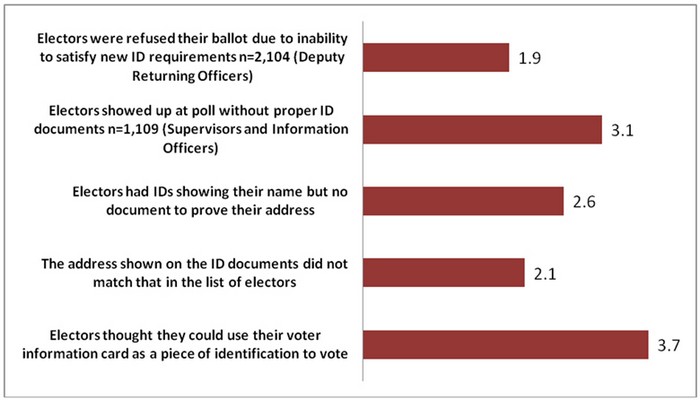
*Only deputy returning officers whose polling station was not on a reserve, in a astudent residence, or in a long term facility.
The Voter Information Card as a Piece of Identification
Officially, the Voter Information Card (VIC) is not accepted as a valid proof of an electors’ identity and address. When electors showed their VIC to identify themselves, most deputy returning officers (56%) reported asking for either another valid piece of ID, or to have another elector vouch for them via oath. Some deputy returning officers even asked specifically for a driver’s license (11%), photo ID (9%), valid proof of address, two pieces of ID (4%) or their Healthcare card (1%).
Looking at the reactions by region, deputy returning officers from Ontario and Saskatchewan were more likely to have explained the procedure (22% and 27% respectively), whereas those from Quebec were less likely to have done this (10%).
Deputy returning officers from British Columbia were more likely to reply that the ID was not valid (14%), while those from Quebec were more likely (5%) to ask for their healthcare card.
In the 2011 general election, Elections Canada expanded a procedure previously tested in the 2011 by-elections which consisted in accepting the VIC as a valid proof of an electors' address. This was limited to three specific target areas which included all polls located on an Aboriginal reserve, in a student residence or in a long-term care facility. For this reason, the survey asked the respondents if their poll was located in any of the targeted areas.
Based on the survey, 16% of polling stations were located in a targeted area, and significantly more, proportionally, in Saskatchewan (26%).
As a result of this particular procedure, deputy returning officers located in the target areas had a different strategy for handling electors who showed their VIC to identify themselves. As shown in the table below, the most frequent action remained to ask for another valid piece of identification; however deputy returning officers located on reserves, LTC facilities, or student residences were less likely to ask for additional ID. Those that were not part of the three target areas were more likely to explain the procedures and less likely to accept the VIC and compare it to available information.
| DRO (regular polls) |
DRO (reserve, LTC or student res) |
|
|---|---|---|
| Asked them for another valid piece of identification/Had someone vouch for them via oath | 58% | 48%- |
| Explained the procedures | 23% | 4%- |
| Asked them for their driver's license | 13% | 6% |
| Asked for a piece of photo ID (unspecified) | 9% | 10% |
| Was not valid, did not accept it/Referred them to people in charge | 8% | 7% |
| Accepted it/Compared to the information I had | 5% | 14%+ |
| Asked for valid proof of address | 7% | 5% |
| Asked for two IDs | 4% | 3% |
| Other reason | 6% | 15% |
Multiple answers accepted (numbers add to more than 100%). Asked only to deputy returning officers whose polling station was on a reserve, in a student residence, or in a long term care facility [Q8] OR who answered that electors thinking they could use their VIC was a least a little bit of a problem (2 and above) [Q34E].

